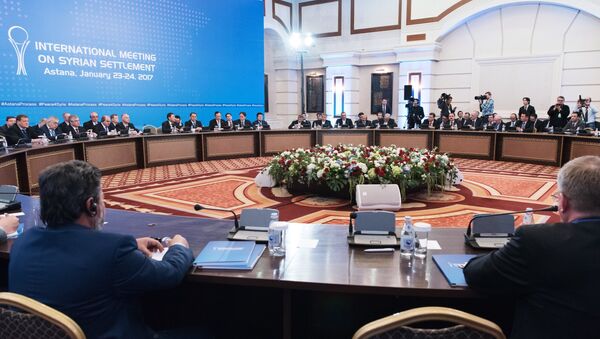ASTANA (Sputnik) — On May 3-4, the Kazakh capital is hosting the fourth round of the Astana talks on Syria. The previous three rounds took place in January, February and March. Russia is represented by Lavrentiev, Director of Middle East and North Africa Department in the Foreign Ministry Sergei Vershinin and Gen. Stanislav Gadzhimagomedov. Earlier in the day, a source said the Syrian delegation suspended its participation in the talks after demanding guarantor countries to put an end to airstrikes in Syria.
"Syrian armed opposition has indeed arrived to the conference room, but soon received some news coming from Al Jazeera alleging that Russian jets carried out missile strikes against moderate opposition near Hama and Daraa. It later turned out that this was not true, according to our information… It appears we are again seeing that the opposition does not want to take on certain commitments in Astana and is thus trying to use any pretext to either undermine or forestall their participation," Lavrentiev said during a briefing.
Russia will nevertheless continue talking with armed opposition alongside Turkey, another Syrian ceasefire guarantor nation, he added.
"The Turkish side thinks that armed Syrian opposition should take part in the talks. If it thinks that there are some problems, these should be resolved. So we hope that common sense will prevail and [Mohamed] Alloush, who heads the delegation, and other senior delegation figures will take part in talks tomorrow. They have not left the country, they are inside the hotel at the moment," Lavrentiev said.
Syrian Astana peace talks proposals on the establishment of four de-escalation zones in Syria includes plans to engage moderate opposition groups in fighting against terrorists, Lavrentyev said.
"Unfortunately, one and a half years on, moderate opposition has not been separated from al-Nusra Front (also known as Jabhat Fatah al Sham, outlawed in Russia)… We decided to go down the route of creating zones where terrorist groups will be engaged by moderate opposition with support from the guarantor states," he said.
The de-escalation zones proposal could also help stop clashes between government forces and moderate opposition groups, he added.
"Russia is making a significant effort in settling the Syrian conflict and is developing various plans to strengthen the ceasefire and making it more effective. In order to improve these efforts, Russia has proposed to create so-called de-escalation zones in Syria. We think that this may help in moving ahead with separating moderate opposition and terrorist groups, mainly Daesh [IS, outlawed in Russia] and al-Nusra Front, and help with significantly reducing confrontations between Syrian armed opposition and government forces," Lavrentyev explained.
The civil war in Syria has been lasting for around six years with government troops fighting against numerous opposition factions and terror organizations such as al-Nusra Front and Daesh, outlawed in Russia.
The nationwide Syrian ceasefire regime was introduced on December 30, 2016. Terrorist organizations are not part of the ceasefire.



